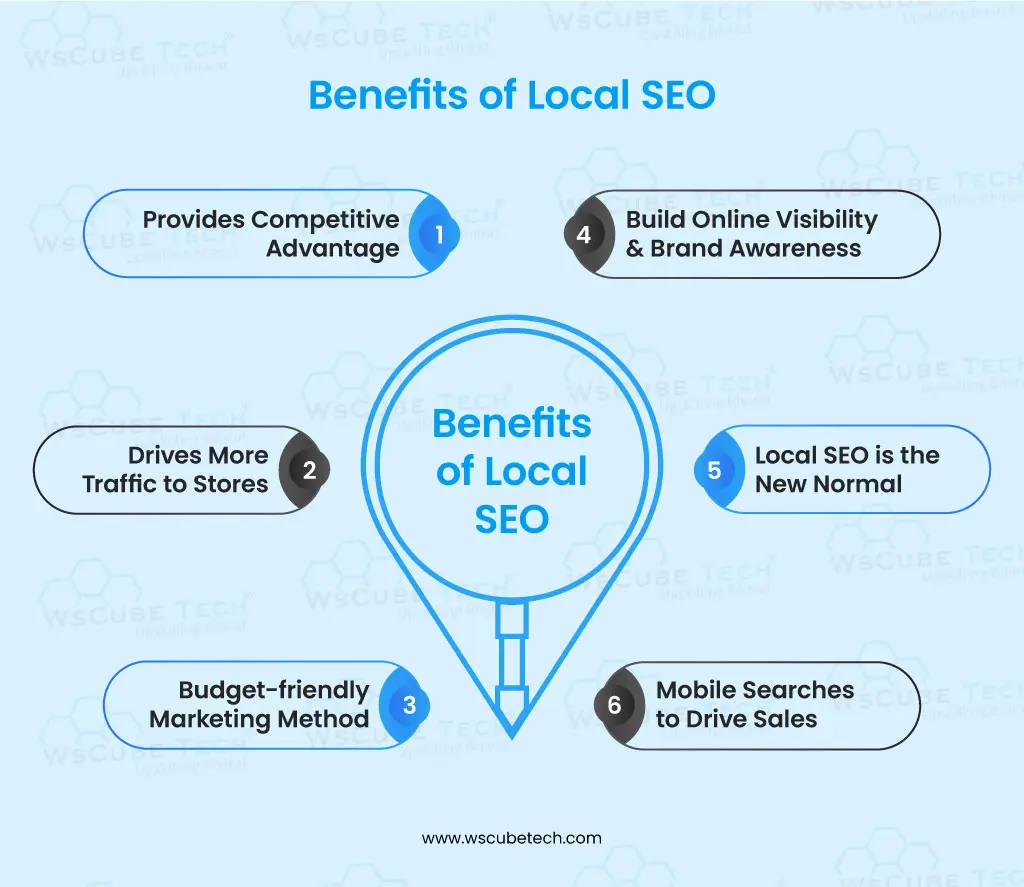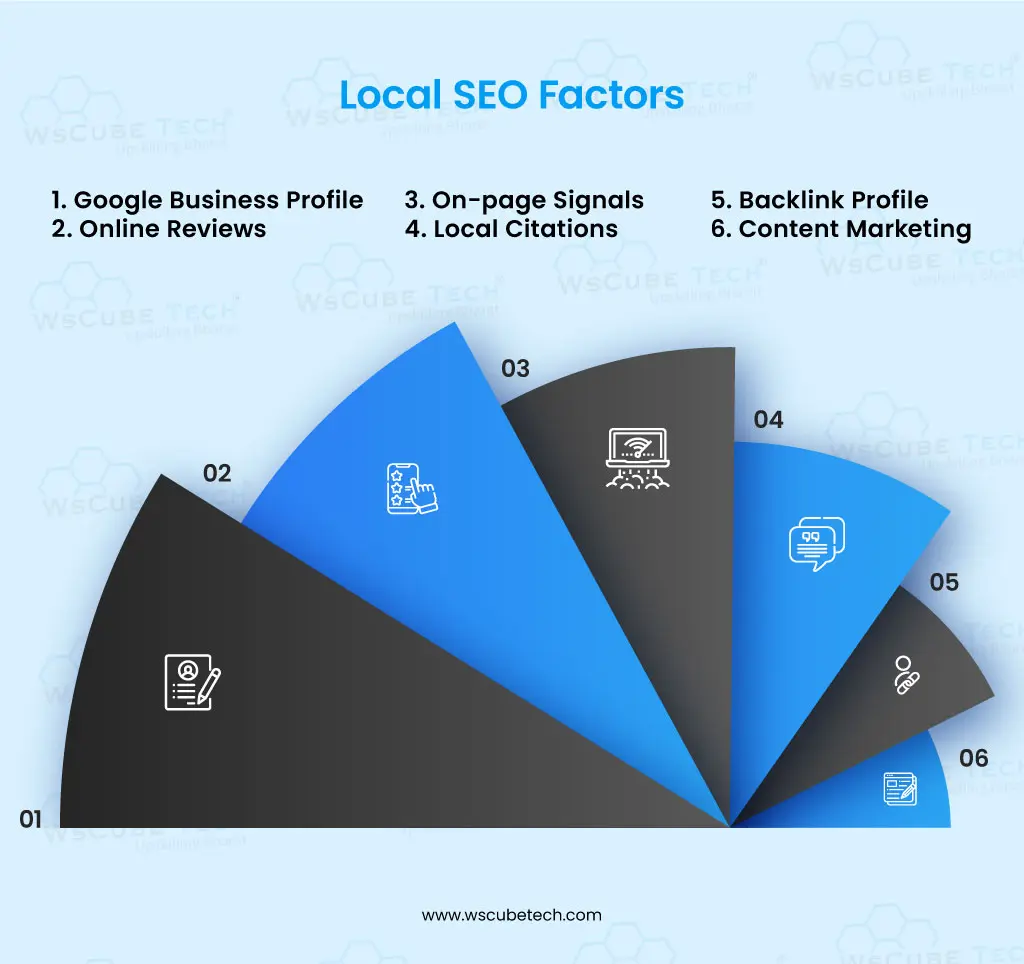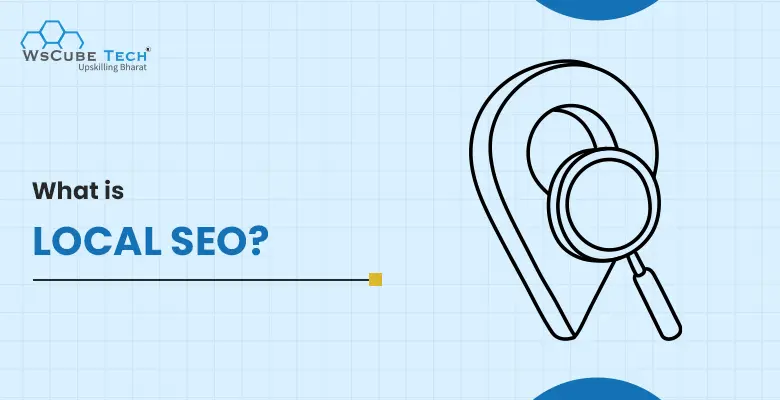In this era where we rely on the internet and smartphones for our daily basic requirements, a strong online presence, especially local search engine optimization, is crucial.
Searches related to ‘near me’ are growing faster than searches that don’t include ‘near me’. In 2017, ‘near me’ searches grew 150% faster than others. This means that local SEO can be a game changer for any business.
Now that we are in 2025, local SEO has become more important than ever. As per a study, 81% of consumers rely on Google to find and evaluate local businesses.
Local SEO in digital marketing allows businesses with physical stores to connect with people in that area by enhancing their online visibility and boosting search engine rankings. Businesses must optimize their local SEO listings to attract more people within that specific location.
Let’s understand in detail what local SEO is, how it works, and how it’s beneficial for businesses.

What Is Local Search Engine Optimization?
Google spares no effort to provide the best answers and solutions to user queries. So, when the Google algorithm realizes that the user is looking for something, products or services, in the nearby area, it shows local search results. It displays organic results regarding local businesses. Hence, marketers and businesses use local SEO to ensure that their product or service is displayed on the top of the local search results.
Local SEO means the practice of optimizing a website or business listing to improve its online visibility in local search engine results. It focuses on making a website SEO-friendly for local searches.
SEO is a broader concept focusing on optimizing a website and boosting its search engine rankings to generate organic traffic. On the other hand, local SEO, a separate branch of SEO, is primarily about optimizing web pages to earn higher rankings for local queries based on a particular location.
We all know that Google is quite smart. So, it can easily detect when the search intent is local and offers accurate results to searchers. That is why it’s essential for local businesses catering to a specific area and with a physical store to use local SEO to gain visibility when people look for goods or services in that location. Enroll for an online SEO course to learn more about local SEO, from the latest updates to the newest approaches!
Local SEO in digital marketing is a hassle-free technique that demands little effort but extensive knowledge. It includes various approaches and technical nuances to prove to Google that your business is relevant to a specific local search query.
The key local SEO tasks include:
- Determining relevant local keywords
- Optimizing Google Business Profile
- Crafting optimized content
Upskill Yourself With Live Training (Book Free Class)
Why Is Local SEO Important?
Before we learn about the importance of local SEO for business, here are a few facts and figures you must read:
- 86% of users trust Google Maps to find the location of a store or business.
- 61% of users have agreed in a recent survey that they search for local businesses or stores every day.
- According to Google, 76% of users conducting local searches on smartphones visit the stores within the next 24 hours, and 28% of these searches result in purchases.
- Also, 30% of these searches that Google processes are related to specific locations.
- According to a recent survey, around 82% of consumers go through online reviews and feedback during local searches, spending around 14 minutes reading reviews before making a buying decision.
- Over half of the internet users around the world prefer mobile devices for local searches.
- 55% of searchers use Google Maps, 31% use Bing, 83% use Google, and 44% use Apple Maps to find nearby businesses.
- Around 74% of in-store shoppers who searched for the businesses before visiting the store said they use search engines to find locations, stores near them, and other hyperlocal information.
- Mobile searches for ‘stores open near me’ have increased by 250% in the past two years, and searches for ‘where to buy’ + ‘near me’ have increased by 200%.
- 54% of searchers check the Google Business Profile of a business to verify operating hours, and 60% of consumers don’t even visit the location in case of questionable legitimacy.
- 40% of local SEO campaigns earn 500% ROI.
Also Read: What is SEO in Digital Marketing? Beginners Guide
How Local SEO Works?
Ever wondered how search engines decide which business to display at the top of search results? Well, it’s far from random!
Google or other search engines use some keywords to discover which businesses to show when a user makes a local search.
1. Relevance
This indicates how closely a business matches what you are looking for. If your keywords match a business, Google thinks that’s relevant.
2. Distance
Google verifies how far a business is from the location when you search. If it’s close to you, Google figure it might be what you need.
3. Prominence
It’s like how important search engine thinks a business is to people. If many users seem to like it, the search engine takes notice.
Google shows 2 types of results:
4. Organic Results
Usually, these are the blue links we see when we search on Google.
5. Local Pack Results
This Google feature shows top local business listings and a map. Additionally, it gets this- Google doesn’t only show low results for searches with city names or near-me words. Even if your search isn’t about local, if Google thinks you are looking for something nearby, it will display local results.
Benefits of Local SEO

Now that we have numbers to understand how important local SEO is for businesses let’s look at a few local SEO benefits that make it an essential marketing tactic.
1. Provides Competitive Advantage
Every business looks for ways to outrank its competitors and stay on top in its niche. For this, it uses every possible tactic and strategy. So, if you are still not using local SEO, be sure that your competitors are, which means they are already way ahead of you and getting the attention of your target audience.
Even if you are the best in the industry and offering top-notch products, it’s of no use if people can’t find you. Amidst other websites and businesses ranking higher in local search results, they have the power, and you don’t matter to searchers.
So, investing in local SEO is your best bet to gain more attention and visibility. Optimizing your website and business for local searches will help you rise in search engine results and compete with other top-ranked pages within your niche. You will also have a chance to be listed among the leading brands in the industry. Enroll in an online SEO course to boost your website’s traffic and visibility.
2. Drives More Traffic to Stores
If you have not embraced local SEO yet, you are missing out on huge traffic and sales. When you optimize your website for local SEO listing, it not only attracts people from nearby places but also potential customers who are visiting the area for a short period.
Local SEO will increase the chances of your website ranking higher on SERPs, so people who are not familiar with the city will rely on Google and can find your business. Also, they will prefer your store to others because you will appear as an organic search result rather than a paid one.
The same stands true for people who are new to your area. You can appear as an established store and build a strong relationship with them as soon as they arrive in the city.
3. Budget-friendly Marketing Method
Compared to other digital marketing strategies, local SEO is an inexpensive and economical way to promote a business. For example, with a pay-per-click marketing method, you need to pay to appear on top of SERPs and for every click you earn.
However, that’s not the case with SEO. Yes, seeking reliable SEO services involves costs but yields long-term and profitable results. Also, when a website has good SEO, it doesn’t fade away. You simply need to continue the effort to boost the website’s ranking and optimize it for users.
Local SEO can provide organic results at a much lower cost than most promotional methods. So what are you waiting for? Join India’s best online SEO course to boost your website’s traffic!
4. Build Online Visibility and Brand Awareness
SEO is not limited to improving search engine rankings; it also focuses on building trust and credibility. Local SEO is an effective way to do so.
As one of the key ranking factors is prominence, a measure to determine the authority and credibility of a website, you can work on various aspects to improve your credibility score, such as getting positive reviews from users, building high-quality backlinks, creating optimized Google Business Profile, crafting SEO-friendly content, etc.
These factors will affect how search engines and users perceive your business. A study has proved that people are 70% more likely to visit a local store or business with an optimized GBP, and 50% of users are likely to buy products or services from businesses with a complete GBP profile.
5. Local SEO is the New Normal
With evolving user behavior and constant technological advancements, the way people search for something online is also changing. Local SEO is no longer an option for businesses but a crucial factor for thriving and achieving success in a competitive space.
More than 55% of searchers prefer voice search to find local stores or businesses. Also, searches with ‘near me’ have increased tremendously. Thus, companies need to include local SEO process to keep up with the changes in the digital marketing industry.
In 2013, Google introduced the BERT algorithm, which is powered by Natural Language Processing (NLP). This technology determines user intent and accordingly provides more accurate, personalized, and relevant results. This has shifted the focus to offering a personalized user experience.
So, whenever a user searches for something, an NLP-powered algorithm recognizes the search intent and delivers local recommendations based on various factors, such as search history, behavior patterns, etc.
6. Mobile Searches to Drive Sales
Whenever we are in the market and have to look urgently for a shop, salon, bakery, or any store nearby, we immediately pull out our smartphones to find them.
When we use mobile devices to look for a business, we see results from local or nearby locations. Also, most mobile phone searches lead to sales. Hence, strong local SEO will make your business more visible online, and you can attract customers easily.
How to do Local SEO?
The points mentioned below will help you know how to do local SEO:
1. Register Your Google My Business listing
To claim your Google My Business listing, get your business featured on Google Maps. After claiming your listing, add details such as your contact information, company hours, and images.
2. Optimize Your Website for Local Search
Your site should include keywords related to your business, area, address, and phone number. It should also have relevant information for your target audience.
3. List Your Business in Local Directories
Several local directories list companies in specific categories and localities.
4. Encourage Positive Customer Reviews
Positive customer reviews boost your local search position. Encourage customers to post reviews by following up with them after their visit or linking to your Google My Business profile.
5. Use Schema Markup
Schema markup aids search engines in understanding the content on your website. You may add structured data to your site using schema markup to inform search engines about your business, such as your address and contact number.
6. Online Presence
Check your internet presence regularly to ensure your information is current and appropriate, and reply to customer feedback or inquiries as soon as possible.
Interview Questions for You to Prepare for Jobs
| Digital Marketing Interview Questions | SEO Interview Questions |
| Email Marketing Interview Questions | Content Writing Interview Questions |
Also Read: How to Learn SEO in 2025? Guide for Beginners
Local SEO Factors

Here are the key factors that you need to take care of for local search engine optimization:
1. Google Business Profile
Creating a Google Business Profile is the most crucial local SEO ranking factor. It marks the presence of local businesses on Google, so it is noticed by search engines and users. It improves the online visibility of a business.
Also, as it is the first thing that users will see while looking for a specific product or service, make sure to list, verify, and manage your business. Share all the details correctly, including business name, address, phone number, opening hours, images, and more.
2. Online Reviews
The majority of customers prefer reading online reviews and available information about a business before making a buying decision. Positive feedback from your clients can build trust and reliability among potential buyers.
Also, it can influence them to make a purchase at the earliest. Hence, encourage your customers to share their feedback on different platforms, as it can support your local SEO efforts.
3. On-page Signals
On-page SEO is an integral part of any local SEO process, as search engines consider numerous on-site elements while assessing a website for local rankings. So, prioritize various on-page factors. Start by strategically placing relevant keywords in meta titles, descriptions, content, and throughout the website.
Also, your business name, address, and phone number must be consistent and clear across all platforms. Also, your website must be compatible with mobile devices, as most location-based searches are done through mobile phones. Mobile responsiveness and user experience are among the top-ranking factors. So, allow users to find your business easily by optimizing your site for local searches.

4. Local Citations
Online citations and directories are similar to Yellow Pages. Citations provide consistent information about a business across the web and helps build backlinks from authoritative websites. They allow search engines to confirm the credibility and details regarding a company and provide useful information to users.
5. Backlink Profile
Backlinks help businesses build authority. Therefore, local businesses must work on acquiring quality links from relevant, reliable, and local websites. While building links from other sites, remember that quality is more important than quantity. One quality link from a top website can surpass 100 spammy links.
6. Content Marketing
Quality and relevant content not only provides valuable information to the target audience but also proves your subject-matter expertise. Users would rely on your website to find answers to their queries, which would automatically boost your search engine rankings. Thus, focus on producing different types of content, such as articles, videos, blogs, infographics, etc.
Important Local SEO Tools
Some handy tools ensure your business shows up when people search locally.
1. Google Business Manager
Formerly Google My Business, this tool helps you manage your Google Business Profile. Signing up for it is free; every local business owner must use it.
2. Google Search Console
A free tool to monitor your site’s search performance. It informs you how much search traffic you get, where it’s going, and what keywords it’s coming from.
3. Ahrefs’ Rank Tracker
This tool lets you track up to 10,000 keyword rankings for organic search by country, state, city, and even ZIP code.
4. Ahrefs Link Intersect
This tool enables you to find websites that link to several competitors and is useful for finding relevant local and industry-specific citations.
5. Google Keyword Planner
A free keyword research tool from Google, it is a useful source of search volume ranges at the local level.
FAQs on What is Local SEO and Why It’s Important
The most significant advantage of local SEO is that it appears first in search engines and Google Maps results. Whenever a business ranks at the top of local search results, it enjoys higher visibility, upsurged site traffic, and more foot traffic to its physical location.
Local SEO optimizes your digital presence to attract customers from relevant local searches. It is vital for businesses that target local customers, such as restaurants, hotels, salons, clinics, etc.
Proximity, prominence, and relevance are the three pillars supporting your business’s local search presence. Local SEO employs technical and creative efforts to notify search engines that your business should be prominent in their results, providing a relevant answer to online users in close proximity to each business location.
Wrapping Up!
Understanding the importance of local SEO is just the first step in your local SEO journey. You have a long way to go to optimize your business, build brand awareness, grow your local customer base, connect with the local community, and reap the benefits of local SEO tactics.
If done right, local SEO can accelerate business growth and establish your brand as an industry leader. Make sure you use effective tools and implement the required on-page and off-page SEO strategies. If you want to see better results with local SEO and optimize your website, contact WsCube Tech and enroll in an SEO course today!
Read more blogs:



